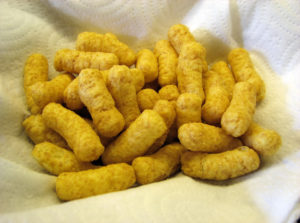Slider photo by Wikimedia Commons.
Kitniyot is a Hebrew word which generally means legumes. During Passover, the word kitniyot takes on a broader meaning to include foods that may not be eaten according to traditional Ashkenazi laws and customs. However, the practice of refraining from eating kitniyot on Passover is not observed by Sephardic Jews, or Ashkenazi Jews who have adopted Sephardic customs.
Certain minhagim, or traditions, and recent rulings have have provided the Jewish community with certain exceptions for the ban on kitniyot. According to the Passover tradition, kitniyot include legumes, but also grains and seeds, such as rice, corn, sunflower seeds, sesame seeds, and peas.

The origin of this ban on kitniyot is unclear, though there are two common theories as to the reason it came about. One theory is that kitniyot are often made into products resembling chametz, or leaven (e.g. cornbread). The alternative theory is that these items are ordinarily stored together with the five forbidden grains (wheat, spelt, barley, oats, and rye), and people worried that they might come into contact with chametz.
The opinions in the Jewish community about kitniyot are varied. The majority of Conservative Jews abide by the ban on kitniyot during Passover. However, the Committee on Jewish Law and Standards, an authoritative body in Conservative Judaism, issued two responsa in Nov. and Dec. of 2015, stating that it was now permissible to eat these previously prohibited foods throughout the world.
Reform Jewish authorities, such as the Responsa Committee of the Reform Jewish Movement and the Central Conference of American Rabbis, have also ruled in favor of permitting kitniyot. Some Orthodox rabbis have argued that the prohibition of kitniyot, while appropriate in Eastern Europe, should not apply to the United States or Israel. However, the Union of Orthodox Jewish Congregations of America and other Orthodox organizations still maintain that the prohibition is binding for all Ashkenazic Jews worldwide.
Eating kitniyot has become more common in Israel due in large part to the influence of Sephardic Jewish food customs there. In addition, recent rulings from authoritative bodies of the Conservative and Reform movements have deemed the consumption of kitniyot on Passover permissible. It is yet to be seen if Ashkenazi Jewry around the world will embrace the new rulings or continue to refrain from eating kitniyot.















































































